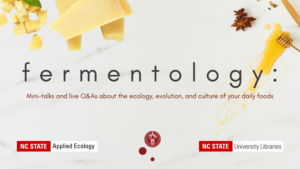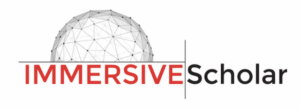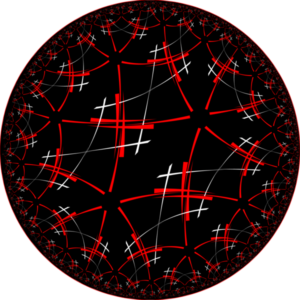Skip to content
Key Projects
Open Science
- Open Science and Reproducibili-Tea
- A monthly Twitch stream about open science hosted by Micah Vandegrift and Sheila Saia. The stream is designed to share their open science knowledge through an informal discussion, teaching concepts along the way, and welcoming and connecting NC State’s open science work with a wider community.
- Fermentology
- Fermentology wa/is a series of mini-webinars facilitated through the Public Science Lab and Applied Ecology department at NC State University. The Open Knowledge Center coordinates the capture and recontextualization of the talks as a web-based publication, in order to extend the content, engage new audiences, and model a new form of communicated, public scholarship.

- Microwave and RF Design Open Textbook
- Microwave and RF Design by Dr. Michael Steer, the Lampe Distinguished Professor of Electrical and Computer Engineering, is a series of five volumes published by NC State University and distributed through UNC Press. The open access textbooks are freely available from the NC State University Libraries, and available for low-cost print-on-demand from UNC Press.
- UNC System Digital Course Library and OER Implementation Collection
- These resources gather reliable open resources and provides videos of presentations from authoritative speakers to answer the most frequent questions faculty ask about how and why to use OER in their courses. The OER Implementation Collection will provide a guide to finding and using OER for faculty and instructors who are interested in working with the UNC digital course enhancement collections and using other open educational resources in their teaching. The OER Implementation Collection was presented at OpenEd20 and is generously supported with federal CARES Act funding.
- Code of Best Practices in Fair Use for Open Educational Resources
- The Code of Best Practices in Fair Use for Open Education is a tool for educators, librarians, and authors to evaluate common professional scenarios where fair use can enable them to incorporate inserts to create OER. It can provide groups working on OER projects with a shared framework for evaluating and understanding when and how to incorporate existing content to meet pedagogical needs. The Code of Best Practices has been presented at OpenEd20 and the Open Education Network’s Summer Institute as well as in our Resilient Digital Materials for Teaching and Learning series. It is generously supported by the Hewlett Foundation and the Institute of Museum and Library Services (RE-248701-OLS).
- Scholarly Communication Notebook
- The Scholarly Communication Notebook (SCN) is a repository of community-designed open resources for teaching about scholarly communication and for doing scholarly communication work in libraries. We intend the SCN to be the locus of an active, inclusive, empowered community of practice for teaching scholarly communications to emerging librarians, where practitioners, LIS educators, and library students work together to increase knowledge and skills on topics of growing importance in librarianship and beyond; topics such as copyright, open access, open education, and library publishing (see Collections below for more topic areas). We hope these resources will be regularly refreshed by librarians and allies as well as by LIS faculty and by students completing coursework on these topics, and that mutually beneficial relationships and bridges are built between users. It is generously supported by the Institute of Museum and Library Services (LG-36-19-0021-19)
- OER + ScholComm
- The OER + ScholComm project brings together a corpus of open educational resources (OER) for teaching library students and professionals about scholarly communication librarianship. We are under contract with ACRL to develop an open textbook (expected in fall of 2021) and have funding from IMLS to develop an online community/repository called the Scholarly Communication Notebook that will be the locus of an active, inclusive, empowered community of practice for teaching scholarly communications to emerging librarians. The OER + ScholComm project has been presented atOpenEd18,The Library Collective,The Library Publishing Forum, and full-day preconferences atThe Charleston Conference andACRL19. It is generously supported by the Institute of Museum and Library Services (LG-72-17-0132-17;LG-36-19-0021-19).
- Library Copyright Institute
- The Library Copyright Institute is a project to develop a program of systematic, deep instruction in copyright law for librarians. The Institute is specifically targeted at training librarians at institutions with fewer resources and no copyright expert on staff. The premise of the Institute is that we’re all better off when the whole library community is widely and deeply engaged with the legal issues that most directly affect our ability to help users. It is designed to provide immersive training for librarians to master copyright fundamentals, develop competencies in copyright limitations and exceptions such as fair use, and complete hands-on training in the application of copyright to specific areas of librarianship. By design, the immersive experience we aim to provide through the Institute is also meant to encourage the development of a regional community of practice that itself can help participants further learn from each other. The Library Copyright Institute has been presented at ALA CopyTalk and is generously supported by the Institute of Museum and Library Services (RE‐87‐18‐0081‐18; RE-246377-OLS-20) and our materials are available at our OSF site.
- Open Pedagogy Incubator
- is a semester-long program designed to incentivize faculty to go beyond the first step in open education – adopting open course materials – to implement multiple open-enabled practices in their courses. Modeled on theLibraries Alt-Textbook program and the 2019 pilot of ourOPEN Incubator, the Open Pedagogy Incubator brings together a cohort of faculty instructors to develop competencies in open pedagogy through a series of hands-on workshops, curated readings, and cohort discussions. The Open Pedagogy Incubator was presented atOER20 in London andOpenEd20 and was featured in the2020 Horizon Report. You can read more about the program in this story and see all of our materials in ourOSF site.
Knowledge Production
- Immersive Scholar
- Immersive Scholar promotes models and good practices for the building and sharing of large-scale and immersive scholarly works. This program increases the impact of academic visualization environments and the scholarship created within them. Immersive Scholar was launched with the generous support of the Andrew W. Mellon Foundation.

- Tally Tracker Explorer
- Tally Tracker Explorer is a visualization depicting live and archived game data from all players in Tally Saves the Internet, a browser extension that transforms the data that advertisers collect into a multiplayer game. It was designed by Joelle Dietrick and Owen Mundy of Sneakaway Studio as part of the NC State University Libraries’ Immersive Scholar grant, with funding from the Andrew W. Mellon Foundation.

- Tess-Celestial
- Tess-Celestial was a collaborative research project between the libraries and Dr. Radmila Sazdanović to produce a large scale immersive visualization, pairing Dr. Sazdanović’s research on knot theory and her creative pursuits as an artist. Conducted as a local iteration of the libraries Andrew W. Mellon funded project, Immersive Scholar, this Creative Residency ran from July 1, 2018 to August 15, 2018.

- Futurama; Autogeddon
- Futurama; Autogeddon explores the ways that the Interstate Highway System has not just organized the movements of goods and people through time and space, but, like modern communication networks, has determined, to a large extent, an entire culture, its practices, and its values. This project is now housed via PubPub.
- Black Lives Matter Murals
- While made of various materials with different styles, these pieces of community-generated art all illustrate and amplify the important message that Black Lives Matter. Here, Slow looking is coupled with the murals to equip us with the opportunity to experience greater intentionality in sitting with these images, their messages, and the lived realities that they reflect and convey by slowly viewing the entirety of the mural and art.
Works in Progress & Sketches
Resources & Research



![]()

